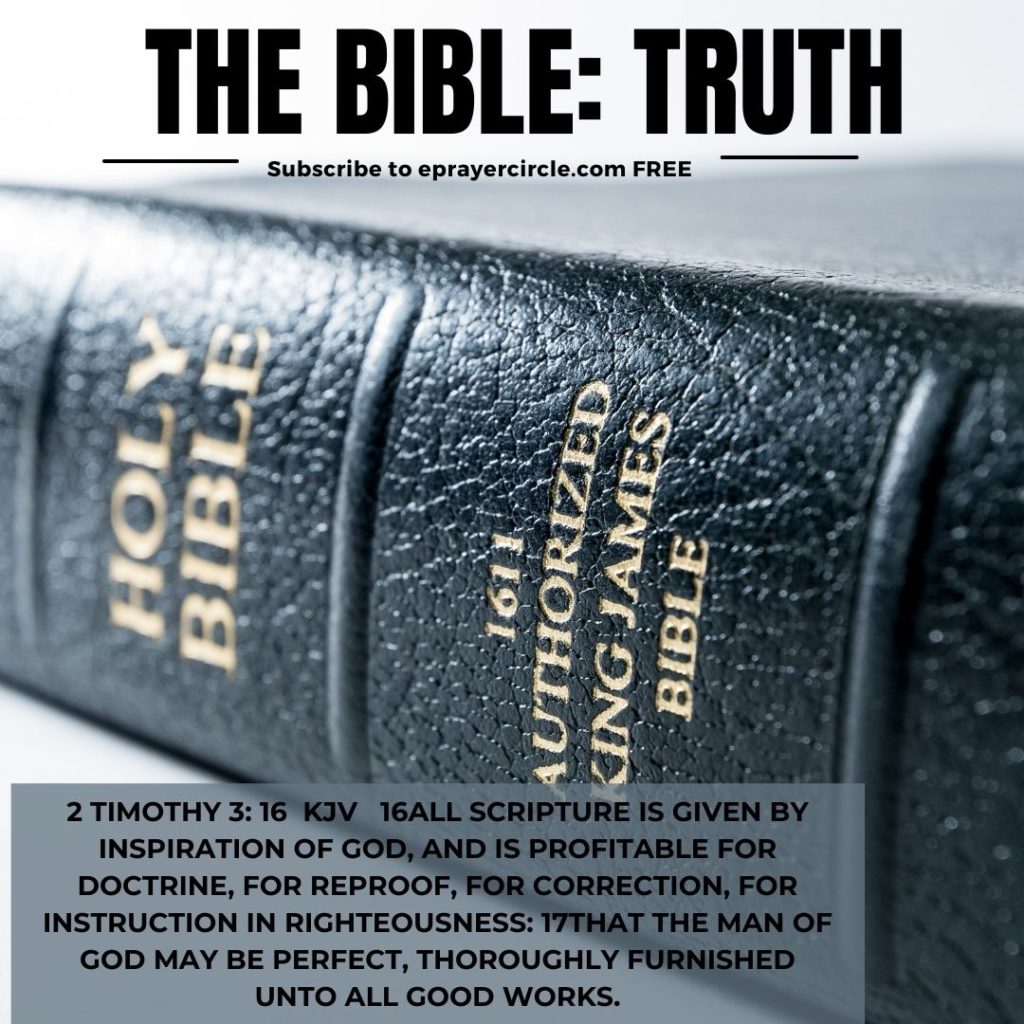Daily Word: Understanding Accountability: Lessons from Eli and Moses
by Admin · Published · Updated
John 14:6 KJV “Jesus saith unto him, I am the way, the truth, and the life: no man cometh unto the Father, but by me.”
Ezekiel 18:19-20 KJV highlights the principle of accountability before God, stating that each person is responsible for their own actions and spiritual journey. This concept underscores the importance of personal responsibility in faith.
The Bible illustrates this through the stories of Moses and Eli and their sons, showing that even the most righteous individuals cannot ensure the spiritual path of their children who are of accountable age. However, neglecting spiritual responsibilities and failing in righteous leadership can bring generational curses.
God spoke to the young Samuel, confirming the judgment against Eli’s household, declaring that He would execute judgment because Eli knew of his sons’ sins and failed to restrain them.
Therefore, even though each of us is accountable for our own actions, the disobedience of spiritual leaders within a family can bring God’s wrath upon the entire household, affecting future generations. This principle also applies to spiritual leadership in governments, where whole countries can be cursed due to unholiness.
The examples of Moses and Eli align with Ezekiel 14:20 KJV, which states, “Though Noah, Daniel, and Job, were in it, as I live, saith the Lord GOD, they shall deliver neither son nor daughter; they shall but deliver their own souls by their righteousness.”
This verse emphasizes that even the most righteous individuals cannot save others through their righteousness alone.
Ezekiel 18:19-20 KJV states, “Yet say ye, Why? doth not the son bear the iniquity of the father? When the son hath done that which is lawful and right, and hath kept all my statutes, and hath done them, he shall surely live.
The soul that sinneth, it shall die. The son shall not bear the iniquity of the father, neither shall the father bear the iniquity of the son: the righteousness of the righteous shall be upon him, and the wickedness of the wicked shall be upon him.”

alt tag: #moses and jesus elijah
Biblical Example: Moses and His Sons
Moses, one of the greatest prophets in the Bible, led the Israelites out of Egypt and received the Ten Commandments from God. He is known for the story of the “The Red Sea.” However, despite his close relationship with God, he was unable to ensure that his sons would follow in his righteous path.
The Bible doesn’t provide detailed accounts of Moses’s sons, Gershom and Eliezer, but it is known that they did not rise to prominence as leaders among the Israelites.
One of Moses’s sons died because he did not heed his father’s wisdom or follow his leadership. This illustrates that even the righteousness of Moses could not secure the spiritual or physical safety of his children, highlighting the principle that each individual is responsible for their own relationship with God.
Hosea 4:6 KJV “My people are destroyed for lack of knowledge: because thou hast rejected knowledge, I will also reject thee, that thou shalt be no priest to me: seeing thou hast forgotten the law of thy God, I will also forget thy children.”
Biblical Example: Eli and His Sons
- Eli was a significant figure in the Old Testament, serving as the high priest and judge of Israel. Eli had two sons, Hophni and Phinehas, who were corrupt and did not follow God’s ways. The Bible notes Eli’s failure to restrain his sons, eventually led to their downfall and death in battle (1 Samuel 2:12-17, 22-25; 1 Samuel 4:10-11).
- Hophni and Phinehas. They were corrupt and abused their priestly roles, committing sins against God and the people. Eli’s failure to discipline them effectively led to God’s judgment against his household (1 Samuel 2:12-17, 22-25; 1 Samuel 3:11-14).
-
The Misconduct of Eli’s Sons
- Corruption in Priesthood (1 Samuel 2:12-17 KJV):
- Hophni and Phinehas, Eli’s sons, were described as “sons of Belial” (worthless men) who did not know the Lord.
- They were corrupt in their priestly duties, taking the best portions of the sacrifices for themselves rather than following the prescribed method of offering the fat portions to God. They would demand raw meat from those who came to sacrifice, threatening violence if their demands were not met.
- Moral Failings (1 Samuel 2:22-25 KJV):
- In addition to their sacrilegious actions, Eli’s sons were also engaged in immoral behavior, sleeping with the women who served at the entrance to the Tent of Meeting.
- Although Eli rebuked his sons when he heard of their actions, they did not listen to him. The scripture notes that it was the Lord’s will to put them to death because of their unrepentant behavior.
- Corruption in Priesthood (1 Samuel 2:12-17 KJV):
God’s Judgment
- Warning from God: God sent a prophet to warn Eli of the consequences of his sons’ actions and his failure to correct them. The warning indicated that his family would lose their priestly privilege, and a sign of this judgment would be the death of his two sons on the same day (1 Samuel 2:27-36) KJV.
- Fulfillment of Prophecy: The prophecy was fulfilled when the Israelites were defeated in battle, and Hophni and Phinehas were killed. The Ark of the Covenant was captured, marking a significant loss for Israel. Upon hearing the news, Eli also died, signaling the end of his priestly line (1 Samuel 4:10-18 KJV).
Legacy
Eli’s relationship with God is a complex one, marked by his faithful service and significant failures. While he served as a priest and judge, his inability to restrain his sons led to personal and national tragedy.
Eli’s story serves as a cautionary tale about the importance of righteous leadership and the consequences of neglecting one’s spiritual responsibilities.

alt tag: #what is life?
Importance of Introducing Children to God
The Bible emphasizes the importance of nurturing children in the faith, as it shapes their character and helps them understand their personal responsibility to God. While parents are responsible for teaching and guiding their children and spiritual leadership, ultimately, each individual of accountable age must choose their path.
By introducing children to God, parents fulfill their duty and contribute to the spiritual well-being of future generations.
This spiritual nurturing is akin to the idea of women being “saved through childbearing” (1 Timothy 2:15)KJV, emphasizing the role of bringing new souls to God’s kingdom and fostering a legacy of faith.
Conclusion
Ezekiel 18:19-20 KJV reminds us of the importance of individual accountability before God. Even righteous figures like Moses could not ensure their children’s righteousness, emphasizing that each person is ultimately responsible for their own spiritual journey.
The sins of Eli’s sons and Eli’s failure to discipline them brought an end to their family line and his rule, highlighting the severe consequences of neglecting spiritual responsibilities.
By living a righteous life and teaching our children about God, we fulfill our duty to guide the next generation and underscore the critical importance of personal responsibility and righteous leadership.
Reflective Question:
How can we strive to guide our children toward a relationship with God, while recognizing individual responsibility for our spiritual journey and leadership?
Keywords
Accountability before God, personal responsibility in faith, spiritual leadership, generational curses, Eli and his sons, Moses and his sons, Ezekiel 18:19-20, righteous judgment, individual actions, spiritual journey, consequences of sin, righteous leadership.
PRAYER CIRCLE: IF YOU WANT THE PRAYER CIRCLE TO PRAY FOR YOU, PLEASE FILL OUT THE FORM: HTTPS://EPRAYERCIRCLE.COM/INDEX.PHP/PRAYER-REQUEST/

Alt tag: #The Bible Truth
CALL TO SALVATION
John 3:16 “For God so loved the world, that he gave his only begotten Son, that whosoever believeth in him should not perish, but have everlasting life.
Romans 10:9-10 9That if thou shalt confess with thy mouth the Lord Jesus, and shalt believe in thine heart that God hath raised him from the dead, thou shalt be saved. 10For with the heart man believeth unto righteousness, and with the mouth, confession is made unto salvation
John 3:5-6 5Jesus answered, Verily, verily, I say unto thee, Except a man be born of water and of the Spirit, he cannot enter into the kingdom of God. 6That which is born of the flesh is flesh, and that which is born of the Spirit is the Spirit.


